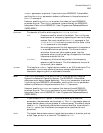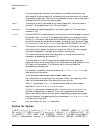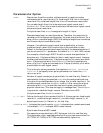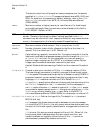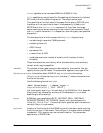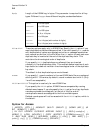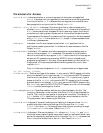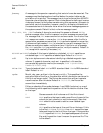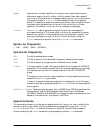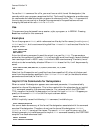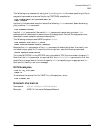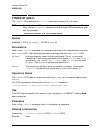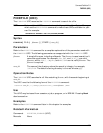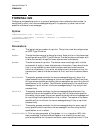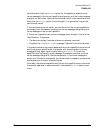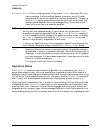
Chapter 4 245
Command Definition F-K
FILE
formid Applies only to output spoolfiles. A string of up to eight alphanumeric
characters, beginning with a letter, which uniquely identifies a special
form that is to be mounted. A message displaying this formid is printed on
the system console or $STDLIST of the associated user of the spooled
device. The spooler process then awaits verification that the special forms
have been mounted before printing the file for which the formid was
specified. The default is that no formid or message is displayed.
PRIVATE The PRIVATE option generates a spool file that may be accessed in
privileged mode only. This means that the file is not accessible to normal
users on the system. Private spoolfiles may not be saved or copied. They
may only be purged, printed, or (within limits) altered by using the
SPOOLF command instead of using the PURGE or COPY commands.
Syntax for Disposition
[ ;DEL ;TEMP ;SAVE ;SPSAVE ]
Options for Disposition
DEL The file is deleted when closed.
TEMP The file is saved in the job/session temporary domain when closed.
SAVE The file is saved in the permanent file domain when closed.
SPSAVE If this parameter is used, the resulting spool file is created with SPSAVE
disposition. This means the spool file is not to be purged after the last copy
of it has been printed, but is instead retained in the OUT.HPSPOOL
group.
This option is only valid for output spoolfiles. Private spoolfiles cannot be
saved with the SPSAVE parameter.
If none of these parameters are supplied, the disposition of the file is as it
was when opened, or as specified by the FCLOSE intrinsic call issued by the
user program.
DEFBLK or OPTMBLK These two options apply only to KSAM files. DEFBLK specifies that
the data block size will be the default data block size of 4096 bytes.
OPTMBLK specifies that KSAMXL will select the optional data block size
based on the record size. The default is DEFBLK.
Operation Notes
This command allows you to change the specifications for files at run time, including the
devices on which they reside, overriding specifications supplied through the FOPEN or
HPFOPEN intrinsic. The FILE command remains in effect for the entire job or session
unless revoked by the RESET command or superseded by another FILE command.



